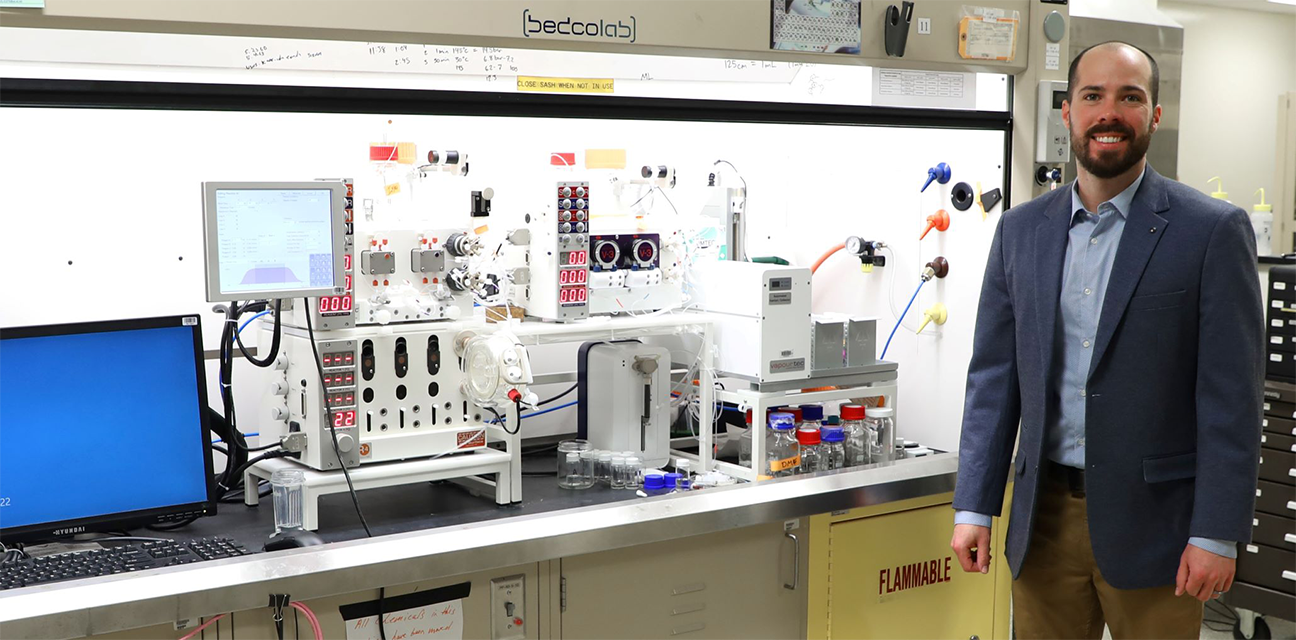WRIGHT-PATTERSON AIR FORCE BASE, Ohio (AFRL) – Chemical research scientist and a member of the Air Force Research Laboratory’s Materials and Manufacturing Directorate, Dr. Luke Baldwin, is working with the Massachusetts Institute of Technology to utilize a new synthetic chemistry tool to produce and improve new reactions on carbon derived nanomaterials.
The collaboration between AFRL and MIT is a three year partnership funded by the Office of the Under Secretary of Defense for Research and Engineering (OUSD(R&E)), Basic Research Office (BRO) through the Laboratory University Collaboration Initiative (LUCI). With this fellowship, Baldwin and co-Principal Investigator, Dr. Christopher Crouse, will initiate collaborative projects with Professor Timothy Swager to propel basic science research on chemical transformations of nanomaterials.
“The LUCI funded MIT and AFRL partnership seeks to create dramatic enhancements in the efficiency for the functionalization of carbon nanomaterials. Current [Chemistry] methods are wasteful and require a massive excess of reagents, most of which produces byproducts that complicate the materials production and performance,” said MIT Professor Timothy Swager.
Baldwin adds, “Another goal of this project is to strategically establish collaborations with AI experts to explore active machine learning for reaction optimization in synthetic chemistry. This would allow scientists to accelerate research by being able to more efficiently explore chemical reaction parameters.”
This LUCI partnership explores a new, controlled chemistry approach called flow chemistry. Flow chemistry is an automated chemical process that ensures efficient mixing and heat transfer resulting in more accurate and consistent chemical reactions. Flow chemistry also facilitates reactions at high temperatures and pressures without needing the complex procedures often required when reaching these conditions in batch reactions. Given the low reactivity of nanomaterials, a new approach is required to effectively and consistently modify carbon nanomaterials. With the ability to combine these materials in an automated fashion, the research teams can safely and quickly perform iterative experiments to create new nanomaterials.
“Flow chemistry system can eliminate the need for a 40 hour work week since they can be coupled to AI algorithms, run continuously, and controlled remotely. This allows for continuous discovery, reaction optimization, and cost savings,” claims Baldwin.
The research findings from AFRL and MIT will find new materials for electromagnetic shielding, sensors, smart fabrics, composites, and other electronics. Working with flow chemistry is also expected to benefit Space Manufacturing and Chemistry by exploring protocols and nanomaterials compatible with microgravity environments.
“Generating highly reactive intermediates in flow reactors at AFRL provides exquisite control that will be used to create materials with superior properties. MIT will provide precursor reagents for these studies and create new chemical/biological sensors and electronic devices from these new generations of materials that are of interest to the DOD,” Swager states.
Through the course of this collaboration, Professor Swager at MIT will routinely send nanomaterials to AFRL and give guidance on experimentation. Chemists at AFRL will perform the suggested reactions and conditions using flow chemistry. The teams discuss the findings and meet on a regularly scheduled basis. The partnership also benefits by working in each other’s laboratories several times a year to gain experience working with different chemistry systems, furthering their knowledge in support of Department of Defense technologies.
“The Department of Defense is the home of big ideas for mission-based problem sets,” said Dr. Bindu Nair, Director for Basic Research in the Office of the Under Secretary of Defense for Research and Engineering. “The Laboratory University Collaboration Initiative Program reflects the Department’s commitment to support unfettered, curiosity-driven research and the innovative spirit of universities by combing their energy to focus on paradigm-shifting ideas that will advance the warfighter.”
For more information about the Laboratory University Collaboration Initiative, visit:
https://basicresearch.defense.gov/Pilots/Laboratory-University-Collaboration-Initiative/

Dr. Luke Baldwin with Flow Chemistry machine. (U.S. Air Force photo/Jonathan Taulbee)

